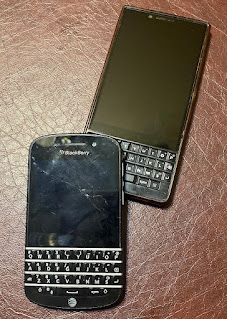From Irrelevance to Obsolescence
From Irrelevance to Obsolescence
I love BlackBerry. The phone, not
the fruit. I had one for years, holding out as long as I could before switching
to an iPhone. Eventually, though, I had no choice; BlackBerry phones no longer
work. They have become completely obsolete.
The really sad part is, BlackBerry didn’t have to fade into oblivion. They were, at one time, the big name in smartphones, dominating the industry, essentially owning the smartphone market. Then, the market grew beyond their target market, leading to changes in what people wanted. Rather than adapting or adjusting to effectively engage those rapid changes and an expanding audience, leaders at Research In Motion (RIM, the Canadian company behind BlackBerry) doubled down on their refusal to change their once successful model.
Eventually, in what was undoubtedly a last-ditch effort to turn things around, RIM switched from its BlackBerry platform to an Android platform. As a devoted BB lover, the switch was not my favorite, but it was manageable. The handwriting was on the wall, however, and within a few short years, BlackBerry phones were done.
The BlackBerry story is ultimately, I suggest, a story of failed leadership. Key decision-makers at Research in Motion (leaders, whatever their titles) made fatefully poor decisions at vital moments. The damage, though likely unintentional, proved insurmountable.
While this is not a perfect analogy, I think the Church is on a similar trajectory. What we’ve tried, for evangelism, for discipleship, for stopping our rapid cultural descent into relativism and secularity, is not working. It does not take a rocket scientist to recognize that hard reality, but it does require courage and leadership to wrestle with the implications effectively.
Please hear me clearly; I am not suggesting we need to adjust our message to accommodate a world that increasingly rejects the existence of any kind of objective and absolute truth. But, in a culture that sees Christians as irrelevant, inauthentic, obnoxious, and potentially dangerous, something needs to change.
Perhaps leaders at Research in Motion (RIM) had similar realizations. Perhaps they looked at different data sets and argued about what inferences should be drawn from the information. Perhaps they gave too much credence to BB devotees and not enough to BB critics. Whatever the conclusions of what I’m sure were frequent and repeated conversations, they missed the mark; BlackBerry (as a phone company) is dead. Perhaps reflective of learning from past mistakes, BlackBerry was able to pivot from producing phones to creating software. While no where near as well known in the US as they once were, the company has found a niche that kept the name alive.
Like the BlackBerry phone, the American evangelical community is well on its way to becoming obsolete. Fewer and fewer young people are engaged in the local church or identifying as Christian. Overall church membership is dwindling. As one generations steps into history and another comes of age, funding decisions will be made by those who do not prioritize religious endeavors. Political decisions are shifting as once widely held and generally accepted values no longer capture popular support.
Church leaders have been trying to be more relevant for decades, changing music, changing architecture, changing staging and presentation (lights, special effects, etc.), even changing our message (in both helpful and destructive ways), with little improvement in overall outcomes. Our culture is not, for all those efforts, more impacted by the Gospel or more familiar with Jesus.
Perhaps church leadership in the evangelical community can take a lesson from the failures of the BlackBerry phone. Rather than doubling down on ineffective strategies focused on solving the wrong problems, we need to look at the challenges differently. We need to wrestle with how we can bring the message of the Gospel to a desperately broken and hurting culture in a meaningfully way without compromising truth. What does that need to look like? How do we make it happen? How do we anticipate and make space for the chaos and confusion that may result? How will we know if we’re heading in the right (most effective or appropriate) direction?
Unlike my beloved BlackBerry phones, the Gospel will never be obsolete. But will the evangelical community move from irrelevance to obsolescence? Will God need to raise up others who can faithfully carry His message of hope? That remains to be seen…

Comments
Post a Comment